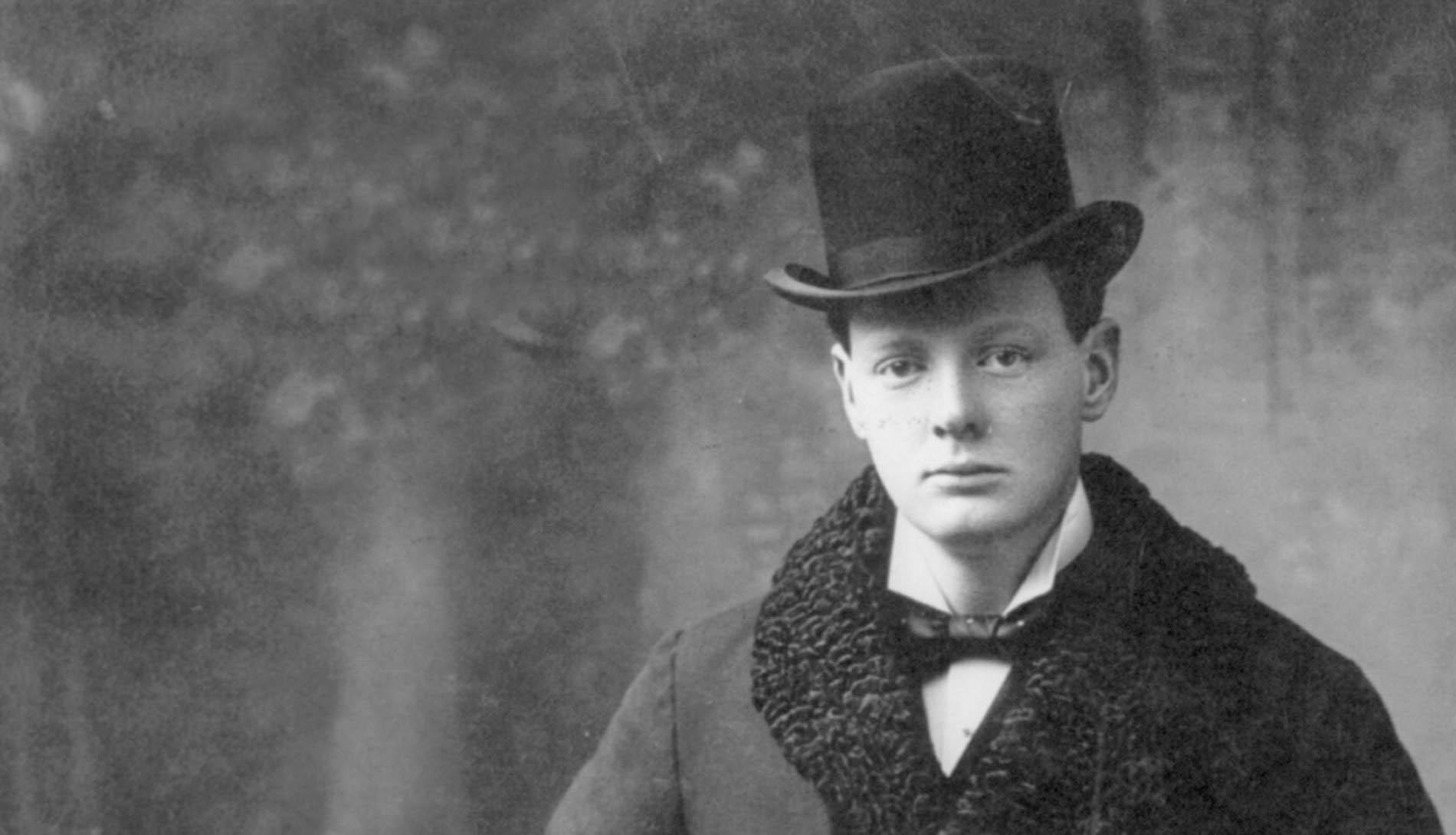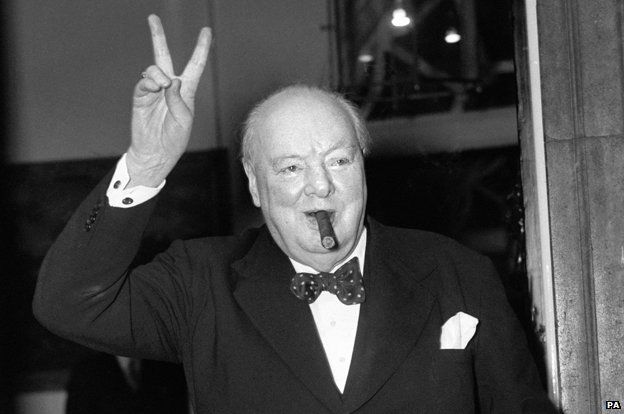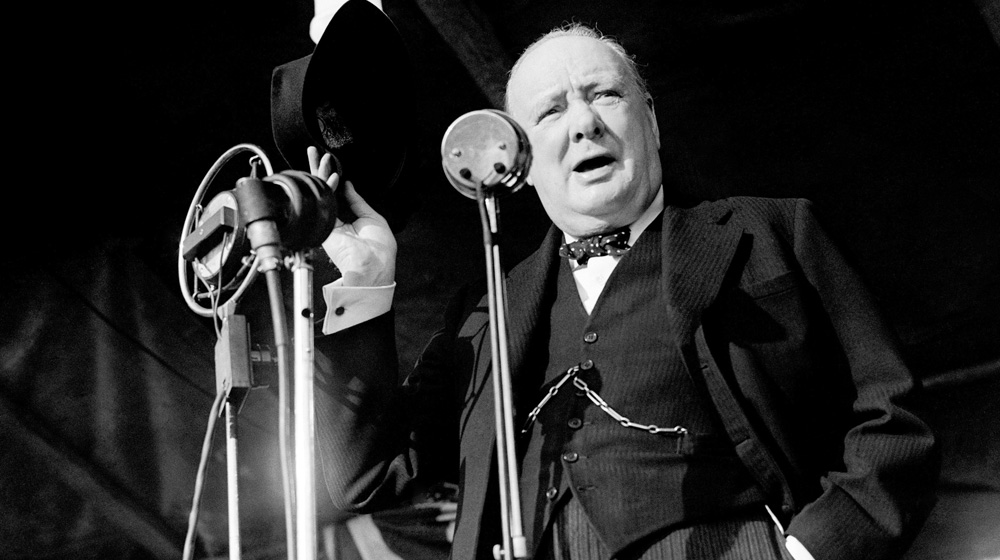Winston Churchill: The Indomitable Spirit of Leadership
 Winston Churchill, a name synonymous with resilience, leadership, and unwavering resolve, stands as one of the towering figures of the 20th century. Born on November 30, 1874, into an aristocratic British family, Churchill's life was marked by a remarkable trajectory of achievements and challenges that left an indelible mark on the course of history. From his early days as a soldier and war correspondent to his pivotal role as Prime Minister during World War II, Churchill's legacy endures as a beacon of courage and determination in the face of adversity.
Winston Churchill, a name synonymous with resilience, leadership, and unwavering resolve, stands as one of the towering figures of the 20th century. Born on November 30, 1874, into an aristocratic British family, Churchill's life was marked by a remarkable trajectory of achievements and challenges that left an indelible mark on the course of history. From his early days as a soldier and war correspondent to his pivotal role as Prime Minister during World War II, Churchill's legacy endures as a beacon of courage and determination in the face of adversity.
Early Life and Education:
Churchill's upbringing was marked by privilege and expectation, yet his early years were fraught with academic struggles and a rebellious spirit. Despite these challenges, Churchill's indomitable spirit and thirst for adventure propelled him to pursue a career in the military. After graduating from the Royal Military College, Sandhurst, he embarked on a journey that would take him to far-flung corners of the British Empire, including India, Sudan, and South Africa, where he gained firsthand experience of warfare and diplomacy.
Political Career:
Churchill's entry into politics marked the beginning of a storied career that would span over six decades. As a young Conservative Member of Parliament, he quickly gained a reputation for his eloquence, wit, and independent-mindedness. Throughout his political career, Churchill held various ministerial positions, including First Lord of the Admiralty and Chancellor of the Exchequer, where he distinguished himself as a reformer and visionary leader.
However, it was Churchill's unwavering opposition to appeasement and his vocal warnings about the growing threat of Nazi Germany that would define his legacy as a statesman. In the years leading up to World War II, Churchill's prescient speeches and writings served as a clarion call to action, urging his countrymen to stand firm against tyranny and aggression.
World War II and Leadership:
Churchill's finest hour came in May 1940 when he assumed the role of Prime Minister at a time of grave peril for Britain and its allies. Faced with the specter of Nazi invasion and the darkest days of the Blitz, Churchill rallied the nation with his stirring rhetoric and steely determination. His famous speeches, delivered with characteristic flair and conviction, inspired hope and defiance in the face of overwhelming odds.
Churchill's leadership during World War II was marked by boldness, tenacity, and strategic foresight. From the Battle of Britain to the D-Day landings, he worked tirelessly to mobilize the Allied forces and coordinate the war effort against Nazi Germany. Despite numerous setbacks and challenges, Churchill remained resolute in his determination to achieve victory, famously declaring, "We shall never surrender."
Legacy and Impact:
Churchill's contributions to the Allied victory in World War II are unparalleled, earning him a place among the greatest leaders in history. His leadership during the war not only preserved Britain's freedom and sovereignty but also played a pivotal role in shaping the post-war world order. As one of the architects of the United Nations and a staunch advocate for international cooperation and peace, Churchill sought to build a world based on the principles of democracy, freedom, and human rights. Moreover, Churchill's literary and oratorical talents left an enduring legacy beyond the realm of politics. His speeches and writings, including his six-volume memoir "The Second World War," continue to inspire and educate generations of readers around the world. Churchill's words resonate with timeless wisdom and insight, offering lessons in courage, resilience, and leadership that are as relevant today as they were during his lifetime.
Moreover, Churchill's literary and oratorical talents left an enduring legacy beyond the realm of politics. His speeches and writings, including his six-volume memoir "The Second World War," continue to inspire and educate generations of readers around the world. Churchill's words resonate with timeless wisdom and insight, offering lessons in courage, resilience, and leadership that are as relevant today as they were during his lifetime.
Winston Churchill's life and legacy epitomize the power of leadership and the triumph of the human spirit in the face of adversity. From his early struggles to his pivotal role in shaping the course of World War II and the post-war world, Churchill's indomitable spirit and unwavering resolve continue to inspire admiration and reverence. As we reflect on his legacy, we are reminded of the enduring power of leadership to shape history and inspire positive change in the world. Beyond his wartime leadership, Winston Churchill's impact extended into the realm of domestic politics, where he championed progressive reforms and social justice initiatives. Despite being a staunch conservative, Churchill recognized the need for change and advocated for policies aimed at improving the lives of ordinary citizens. As Prime Minister, he oversaw landmark legislation such as the Education Act of 1944, which laid the foundation for Britain's modern education system, and the National Health Service Act of 1946, which established universal healthcare for all British citizens.
Beyond his wartime leadership, Winston Churchill's impact extended into the realm of domestic politics, where he championed progressive reforms and social justice initiatives. Despite being a staunch conservative, Churchill recognized the need for change and advocated for policies aimed at improving the lives of ordinary citizens. As Prime Minister, he oversaw landmark legislation such as the Education Act of 1944, which laid the foundation for Britain's modern education system, and the National Health Service Act of 1946, which established universal healthcare for all British citizens. Churchill's commitment to democracy and the rule of law was unwavering, even in the face of political opposition and personal adversity. He staunchly defended the principles of parliamentary democracy and individual liberty, earning him widespread admiration and respect from both sides of the political spectrum. Throughout his career, Churchill demonstrated a remarkable ability to bridge divides and forge consensus, bringing together disparate factions for the greater good of the nation.
Churchill's commitment to democracy and the rule of law was unwavering, even in the face of political opposition and personal adversity. He staunchly defended the principles of parliamentary democracy and individual liberty, earning him widespread admiration and respect from both sides of the political spectrum. Throughout his career, Churchill demonstrated a remarkable ability to bridge divides and forge consensus, bringing together disparate factions for the greater good of the nation.
Furthermore, Churchill's legacy as a statesman and diplomat extended far beyond the borders of Britain. His vision for a united Europe, articulated in his famous Zurich speech in 1946, laid the groundwork for the European Union and the process of European integration that followed in the decades after World War II. Churchill's call for a "United States of Europe" reflected his belief in the importance of collective security and cooperation in a post-war world ravaged by conflict and division. Moreover, Churchill's role in shaping the post-war settlement extended to the global stage, where he played a key role in shaping the course of international relations and diplomacy. His wartime alliance with the United States and the Soviet Union laid the foundation for the United Nations and the principles of collective security and multilateral cooperation that underpin the modern world order. Churchill's advocacy for a "special relationship" between Britain and the United States helped to solidify Anglo-American cooperation and collaboration in the decades that followed.
Moreover, Churchill's role in shaping the post-war settlement extended to the global stage, where he played a key role in shaping the course of international relations and diplomacy. His wartime alliance with the United States and the Soviet Union laid the foundation for the United Nations and the principles of collective security and multilateral cooperation that underpin the modern world order. Churchill's advocacy for a "special relationship" between Britain and the United States helped to solidify Anglo-American cooperation and collaboration in the decades that followed.
In the twilight of his career, Churchill continued to be a voice of wisdom and experience, offering guidance and counsel to successive generations of leaders. His statesmanship and moral authority earned him the respect and admiration of leaders around the world, cementing his status as one of the preeminent figures of the 20th century. Even in his later years, Churchill remained actively engaged in public life, advocating for causes dear to his heart and serving as a symbol of resilience and fortitude for a generation scarred by war and upheaval. In conclusion, Winston Churchill's life and legacy encompassed far more than his role as a wartime leader. He was a statesman, a reformer, and a visionary whose impact extended across the globe. From his early days as a rebellious youth to his towering presence on the world stage, Churchill's indomitable spirit and unwavering commitment to freedom and democracy continue to inspire and resonate with people around the world. As we reflect on his legacy, we are reminded of the enduring power of leadership to shape history and inspire positive change in the world.
In conclusion, Winston Churchill's life and legacy encompassed far more than his role as a wartime leader. He was a statesman, a reformer, and a visionary whose impact extended across the globe. From his early days as a rebellious youth to his towering presence on the world stage, Churchill's indomitable spirit and unwavering commitment to freedom and democracy continue to inspire and resonate with people around the world. As we reflect on his legacy, we are reminded of the enduring power of leadership to shape history and inspire positive change in the world.



![[LIVE] Engage2Earn: Shayne Neumann MP Blair boost](https://cdn.bulbapp.io/frontend/images/d0ae7174-2ceb-4eed-9844-e1c262a4013e/1)








































![[ℕ𝕖𝕧𝕖𝕣] 𝕊𝕖𝕝𝕝 𝕐𝕠𝕦𝕣 𝔹𝕚𝕥𝕔𝕠𝕚𝕟 - And Now What.... Pray To The God Of Hopium?](https://cdn.bulbapp.io/frontend/images/79e7827b-c644-4853-b048-a9601a8a8da7/1)
